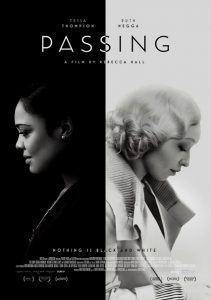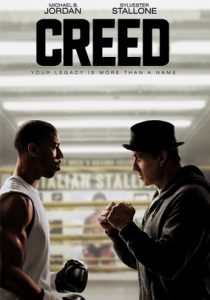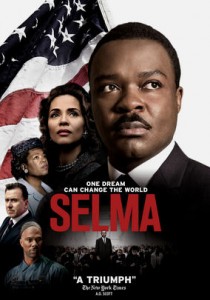Passing-2021
Director Rebecca Hall
Starring Tessa Thompson, Ruth Negga
Scott’s Review #1,222
Reviewed January 22, 2022
Grade: A
Passing (2021) is a quiet film brimming with importance. It’s the feature directorial debut of Rebecca Hall, and she hits a home run with a movie pleasing both visually and from a storytelling perspective.
The title of the film equates to the word ‘passing’, referring to three different meanings, as the viewer will need to wait until the end to figure it out. I was not able to deduce the third meaning until I read the synopsis and was left in a state of shock.
The setting is 1920s New York City, a polished time when status and sophistication meant everything. Unfortunately, despite the liberal-leaning metropolis, racism is still alive and kicking.
The first scene shows a pair of well-dressed ladies entering a store, commenting how thankful they feel that their children have only met ‘colored’ people who are members of their staff. The message is clear that they think anyone of dark skin is a leper.
Passing is a film about race, but so much more.
Tessa Thompson plays Irene Redfield, a well-to-do light-skinned black woman who is married to a successful doctor, Brian (André Holland). They reside in Harlem in a predominantly black neighborhood.
Irene is respected and is also able to walk amongst cultured white people and ‘pass’ for white. She is treated differently when she does.
One day, Irene stops for a sandwich at a posh hotel. She runs into her childhood friend Clare (Ruth Negga), who is also of mixed race. Clare completely passes for white and is married to a successful and handsome banker, John Bellew (Alexander Skarsgård).
He makes no secret of despising black people.
As Irene and Clare reconnect, Clare begins to immerse herself in the black culture and specifically in Irene’s life. She flirts with many black men and grows close to Brian, much to Irene’s chagrin. Irene becomes both jealous and enamored with Clare.
They both risk their established lives as they soul-search for their truths.
Passing is not conventional, and that’s what I admire and love about it. While watching, I never knew what direction the film was going in, and I missed one subtle, yet essential, detail- Irene’s fascination with Clare.
The complex relationship is shaken to the core in a jarring final sequence during a winter party in a luxury apartment.
Hall makes the monumental good decision to film in black and white cinematography, thus making the racial subject and tones all the more powerful.
Visually, this is never more evident than when Clare stands beside a darker-skinned black character. The contrast is astounding and made me believe how everyone would be fooled into thinking she is a white woman.
The story of two cultured black women navigating life in the early twentieth century is compelling enough, but the underlying themes that emerge add depth to the meaning of Passing, layering it with a wealth of emotional complexity.
The film reminds me of the 2002 masterpiece Far from Heaven. Visually brilliant and both offering stories about race, they are also tragic. Nobody ends up happy or fulfilled, and a terminal sense of loss is palpable in each. A tortured, well-manicured central character exists in both films.
Negga has received the lion’s share of praise for playing Clare, but Thompson is also flawless.
Both actresses are brilliant in their portrayals of characters who are very much alike. They strive for perfection but are nonetheless living in fantasy worlds, whether they realize it or not. It’s tough to convey this to audiences, but they do in measured calmness.
The film shows that we all pretend just a little bit and pass it off sometimes, don’t we?
It’s a scary realization.
My standard modus operandi when I review a film is to think whether it stays with me after the credits roll or if it is quickly dismissed from my train of thought.
Passing (2021) has powerfully remained in my mind and caused me to ruminate and peel back the onion more and more in this tremendous and stylistic effort.
Independent Spirit Award Nominations: 2 wins-Best Supporting Female-Ruth Negga (won), Best Cinematography (won)



